

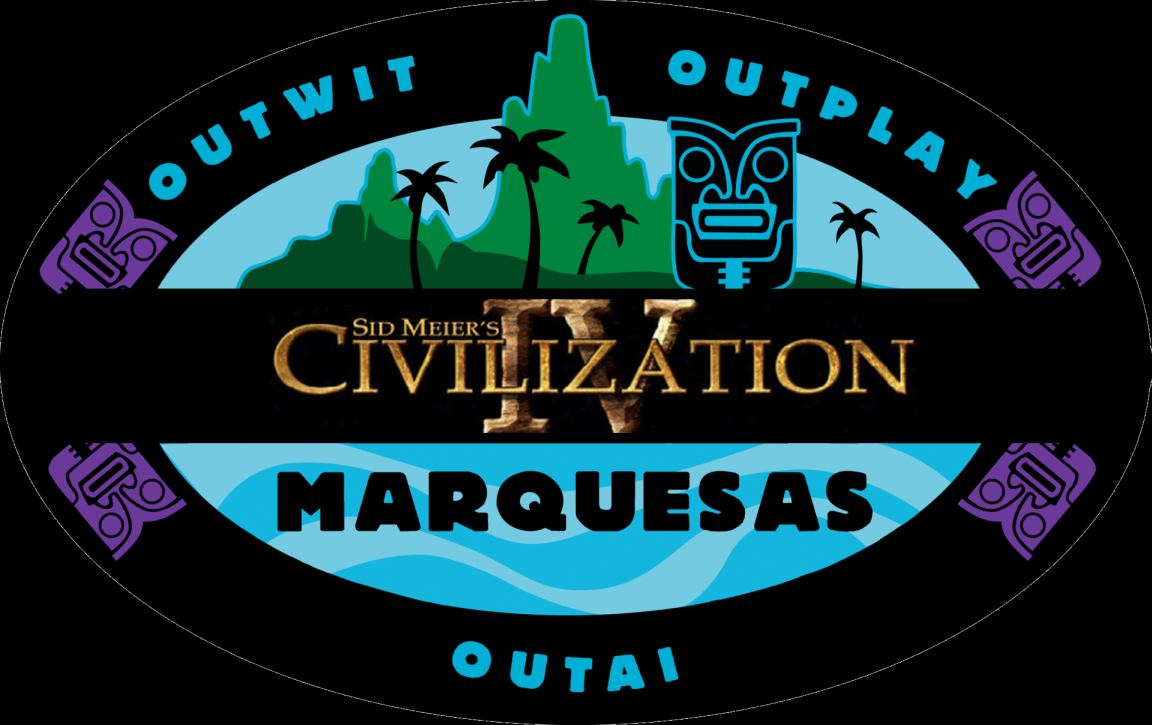
The third and final playoff game of Season Four was made up of leaders with stark contrasts in overall game strategy. Over on the eastern side of the map this match featured Julius Caesar and Boudica, aggressive conquest-heavy leaders who would be looking to dominate their opponents. Neither one of these leaders would have much chance in an extended tech race, but they both brought early game unique unit swordsmen with a lot of smashing power. At the other end of the spectrum were Darius and Roosevelt in the south, leaders with good economic traits who wanted to be left alone to develop their cities in peace. Darius won his opening round game by virtue of simply out-teching everyone else and becoming effectively invincible. The remaining two leaders had their own differing strategies, with Suryavarman being heavily expansion-focused and Charlemagne concentrating on religion. Their potential duel in the northwest corner of the map would go a long way towards determining whether we would see a peaceful or militaristic ending to this game.

The early stages of this game played out pretty much as expected. Charlemagne opened up with Meditation research and founded Christianity as soon as Turn 9, followed by Boudica who began with Fishing tech for her seafood resources and then went right into Polytheism. The Celts founded the second religion shortly thereafter, picking Islam and resulting in a situation where both of the early religions were next to one another at the top of the map. It would take some time for these religions to spread to the southern and eastern corners of the continent. No one researched Monotheism for a very long time afterwards, with Roosevelt finally establishing the third religion as Buddhism as late as Turn 63. This ended up being a game where religion did not play a major role in determining the diplomatic situation.
The heavy pregame favorite in the picking contest had been Julius Caesar, with about 60% of the contest entrants choosing to back the Romans due to the iron resource that appeared at their capital. Caesar did expand quite well in the early stages of this game by racing out to five cities. However, the terrain outside of Caesar's capital was buried in jungle and he failed to research Mysticism tech for ages on end, therefore leaving these new cities unable to expand their borders. The net result was Caesar ended up with a bunch of cities that lacked food and luxury resources, leading to a crashed economy and a terrible 30% research rate. Even though Caesar had the good fortune to pop Bronze Working tech from a goody hut in the first five turns of the game, he wouldn't reach Iron Working until a very late date.
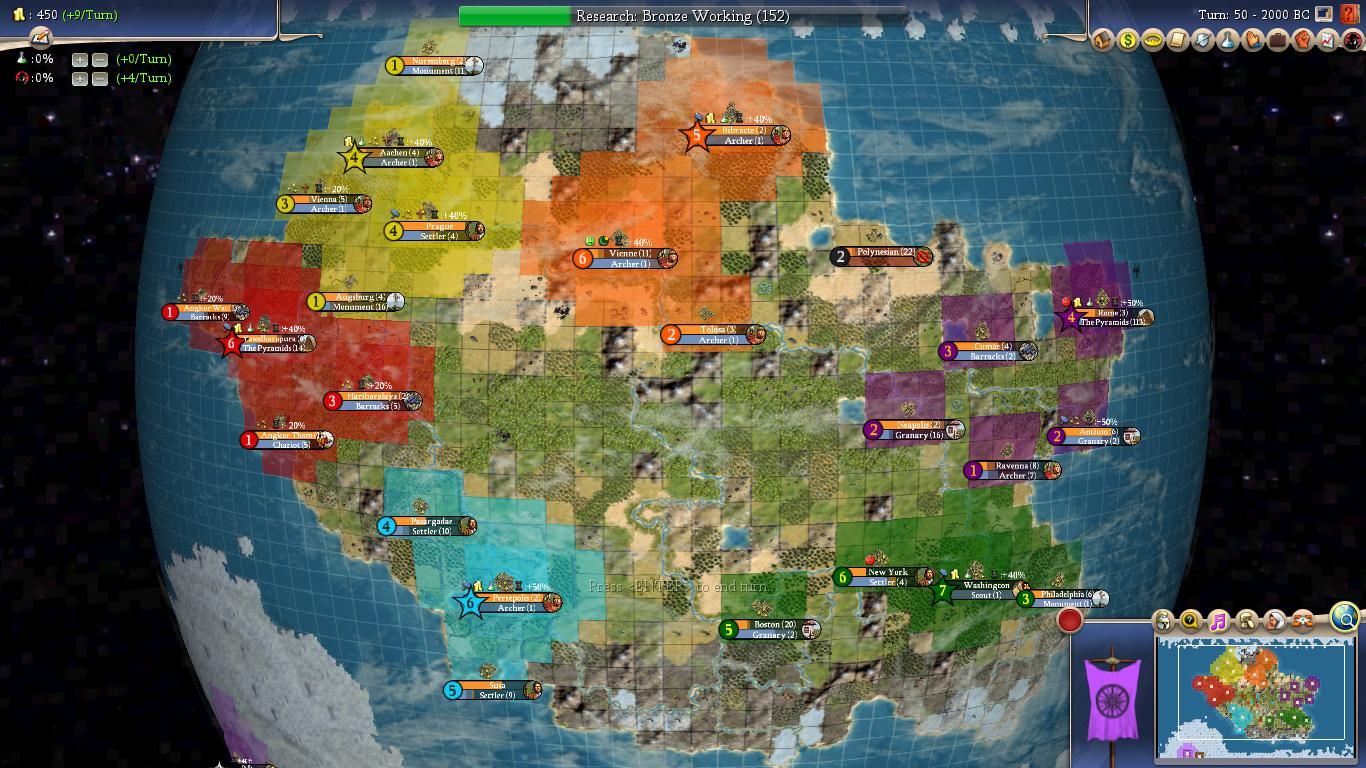
Elsewhere on the map, Roosevelt had expanded almost directly to the west and began to cut into the territory that we expected would go over to Darius. The Persian leader had raced out in front of the rest of the field in the early tech competition, and he had mostly expanded towards Suryavarman in the early going. Darius could certainly afford more cities from an economic perspective, he simply needed to get more settlers out on the map. Eventually he would do so but not until Roosevelt had grabbed some choice lands in the floodplains river valley between them. Up in the north, Charlemagne was doing an excellent job of expanding out of what had looked to be the weakest starting position on the map. The extra culture from his Christian Holy City at Prague had helped to claim a gold resource in the city's third ring, and that along with ivory and a silver resource in the extreme north at Nuremburg was helping him out markedly. Charlemagne had been the top pick in the First to Die category and it seemed like he might become more than a speed bump for someone else in this game.
Boudica had been struggling to expand for unclear reasons despite a lot of empty territory surrounding her civ's borders. Perhaps she had faced more trouble with barbarians than some of the other leaders. Boudica had also paused to build Stonehenge in her capital, and while the free cultural border expansions were helpful, that may have also delayed her settling. In terms of the other early wonders, Darius had wasted time building the not-terribly-useful Great Wall while Suryavarman finished the significantly more useful Pyramids. The Khmer were looking pretty strong on the scoreboard, in second place behind a rather surprising Roosevelt as the game reached the end of its landgrab phrase. However, Suryavarman found himself out of room for further expansion after hitting five cities, and he had also narrowly been denied access to a pair of iron resources due to aggressive settling along the Khmer borders from Darius and Charlemagne.
This would end up being enormously significant. Charlemagne launched an early attack against Suryavarman on Turn 77, sending about half a dozen swords across the border in pursuit of the Khmer capital. This is exactly the sort of ineffective war that we've seen dozens of times previously in AI Survivor, a militaristic leader initiating a doomed invasion where they charge a bunch of swords and axes into 50% walled city defenses and see everything get slaughtered as a result. However, there were three key differences here. The first was that Suryavarman had been doing some heavy wonder building in his capital and lacked much in the way of defenders. The second was that the city of Yasodharapura was located on flat ground and not on a hill for the additional defensive bonus. And the third was Suryavarman's lack of any metal resources, meaning he had nothing but archers and chariots on defense. If Charlemagne landed one or two lucky 30% odds wins in his sword vs archer matchups, he might be able to take the Khmer capital, and it turned out that this was exactly what happened:

Based on what I saw going into the battle, Charlemagne was somewhat unlikely to capture the city but only needed to get lucky once or twice to flip the results. Early game warfare with small numbers of units on both sides can be "swingy" in this way, and we ended up with a massive game-changing result due to one or two good dice rolls on Charlemagne's part. The capture of the capital city immediately delivered the Pyramids over to Charlemagne (which he used to go into Police State civic) and sliced the Khmer territory in half. Even worse, it cut off the only source of horses under Suryavarman's control. The Khmer were left with no copper, no iron, and no horses, unable to build any units aside from archers and warriors. This was therefore a dead civ walking, totally helpless to resist the continuing Holy Roman attacks. As for Charlemagne, he immediately rose up to the ranks of one of the game's dominant powers. This was nothing short of incredible for a leader with a poor starting position that the picking contest had given up for dead before the game started.
Over the following turns, Charlemagne methodically captured one Khmer city after another. There was literally nothing that Suryavarman could do aside from whip out additional archers, units which were easy prey for the highly promoted Holy Roman swords. Suryavarman even constructed the Great Lighthouse in one of his coastal cities, a wonder that was swiftly taken off his hands by the invaders. This prize was highly valuable for Charlemagne due to his own coastal capital. The one and only salvation for Suryavarman would be another civ entering the war on his side, and eventually that did take place shortly before Turn 100:
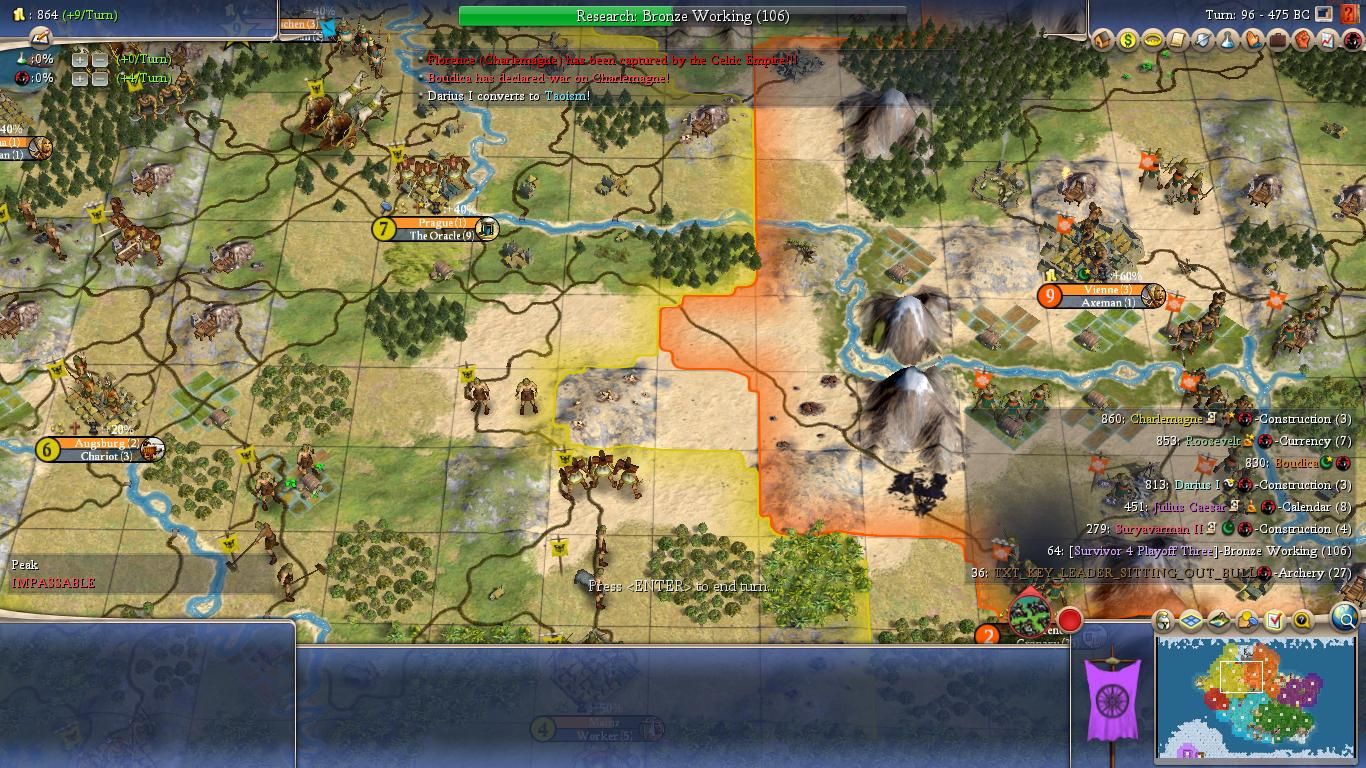
Boudica declared war on Charlemagne and successfully captured the border city of Florence. These two leaders strongly disliked one another due to peace weight differences along with religious rivalry, and this was the very reason why so many people had anticipated Charlemagne being the First to Die, rolled up between Suryavarman and Boudica on either side. The Celtic attack didn't arrive until the Khmer were almost eliminated, and although it did capture that one border city immediately, Boudica was already too late to save Suryavarman. The Celtic offensive continued on to the next Holy Roman city at Mainz (under the interface in the screenshot above) where there was an intense battle over control of the city. Boudica came extremely close to taking this prize only to be foiled by some defensive units with extremely hefty promotions, including one Protective archer that ended up getting all the way to City Garrison III + Drill III and survived with 0.1 health remaining. This was one point in time where the Protective trait actually worked out well. The siege of Mainz came up just short and Boudica fell back to regroup.
Out in the rest of the world, Roosevelt had founded Buddhism as a religion and switched to it, followed by Darius reaching Code of Laws first and establishing his own Taoism. With the game's four leading civs all practicing four different religions, this turned into a game with no significant religious blocs. Darius also researched an early Calendar tech and used it to connect four different luxury resources in his territory, with the resulting surge of happiness bringing all of his cities to much larger sizes and allowing them to work more Financial cottages. The Persian economic engine was off and running in earnest. Over in the east, Julius Caesar launched an attack against Roosevelt, but the five-city technologically-backwards Roman Empire was in a poor position to prosecute an offensive. The net result was Caesar losing his own border city of Ravenna followed by a peace treaty. Roosevelt likely could have made further gains against the weak Romans but he lacked the killer instinct to continue pushing the attack, even in a war that he was winning.
Boudica eventually signed a peace treaty with Charlemagne on Turn 107, and this meant that time was up for Suryavarman:
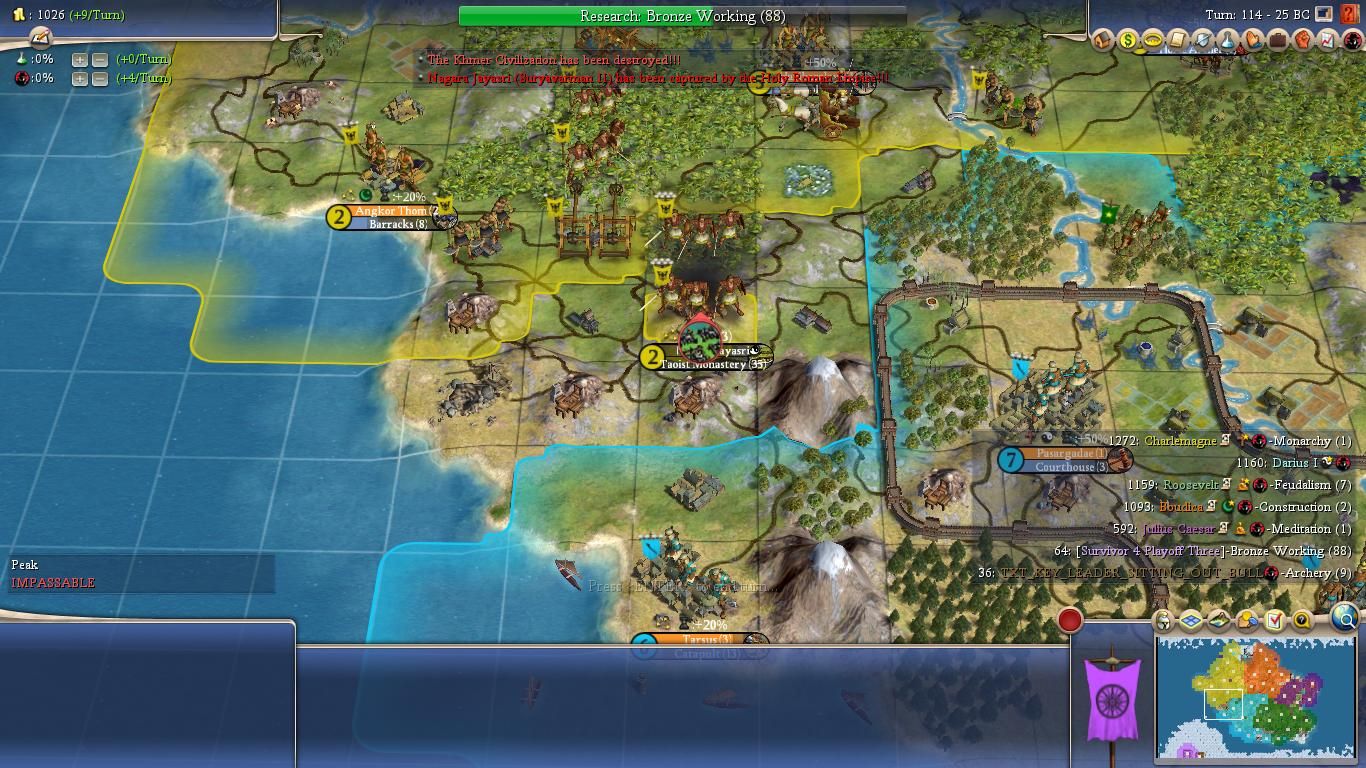
The early elimination of the Khmer reminded me of Pacal's quick destruction in the opening round of Season Four. A low peace weight leader with good economic traits managed to get blindsided by an attack from a neighbor when they lacked metal resources, followed by getting rolled up in short order. Charlemagne ended up taking all five Khmer cities, although this final city of Nagara Jayasri was swamped by Persian culture and was eventually gifted to Darius, plus the border city of Florence had been captured by Boudica during their short war. Thus it was only a net gain of three cities for Charlemagne but that simple tally underscored the importance of his victory. Many of the Holy Roman cities had previously been crushed by Khmer culture and were formerly unable to work most of their tiles. With Suryavarman gone, Charlemagne was now uncontested on the northwest side of the map and had emerged as one of the dominant powers in the game. We were effectively looking at four major civs in the form of Charlemagne, Darius, Roosevelt, and Boudica, with Julius Caesar a distant trailing rump state.
There were two major rivalries existing amongst the five remaining civs in the game. Boudica and Charlemagne continued to hate each other due to their previous war and religious differences, and further conflict between the two of them seemed inevitable. There was also a simmering feud between Roosevelt and Julius Caesar, which was a bit on the backburner due to Roosevelt's pacifism and Caesar's general weakness. Darius stood alone outside these conflicts, happy to sit back in the Eternal Infrastructure Christmas and tech away in peace until the end of time. In the wider world, it didn't take too long until Charlemagne launched an attack against Boudica on Turn 122. He quickly captured back the border city of Florence that had been taken in the previous war and began marching deeper into the Celtic core. However, Boudica had lightbulbed Theology tech with a Great Prophet and ended up building the Apostolic Palace right as this war was heating up in earnest. To no one's surprise, she used the AP to stop the ongoing war:

Since no one else practiced Islam in this world, Boudica could easily pass whatever resolutions she wanted. Ten turns later she reassigned the city of Florence back to herself in another vote, neatly undoing all of her losses from the war. This was the Apostolic Palace at its absolute worst, a single civ controlling all of the votes and using it to erect a magical shield of protection against incoming aggression. Charlemagne had been blocked from achieving what had looked to be another certain conquest. We did note that Roosevelt did not have any Islamic cities in his territory, which could open him up for a potential Crusade vote later on should America and the Celts ever come to blows.
The following turns didn't see any major changes in the geopolitical situation. Julius Caesar attacked Roosevelt again, resulting only in another stalemate war with no cities changing hands on either side. This was a prime opportunity for Roosevelt to gain land for himself and he simply didn't take it, failing to build enough units to push an offensive despite having double the cities held by Rome. This was pretty weak play from Roosevelt and it reinforced the narrative that he's a poor leader in AI Survivor terms. Charlemagne invaded Boudica again and was once again blocked from capturing any cities by another Apostolic Palace resolution. The heated feud between those two continued to have no resolution. And meanwhile Darius continued to race out in front in the tech race, landing the Liberalism prize on Turn 161 and the free Great Merchant at Economics tech. He used that Great Merchant for a Golden Age, then built Taj Mahal for a second following Golden Age afterwards. Darius was about half an era ahead in tech right now and looked to be the favorite to win by spaceship if the game continued to remain largely peaceful.

A new wrinkle finally developed on Turn 168 when Charlemagne declared war on Julius Caesar. Blocked by the Apostolic Palace from attacking Boudica, Holy Rome had apparently found another target for aggression. Charlemagne was joined in this war a few turns later by Roosevelt and it seemed like a partition of the small Roman lands was imminent. However, Boudica then decided to counter-invade America by launching her own attack against Roosevelt, and this took the force out of the American offensive. Roosevelt captured one Roman city along his northern border, then was forced to pull back and defend his core from waves of Celtic knights. This was highly significant because we had a close race on the scoreboard between Charlemagne and Roosevelt. With the presumption that Darius would win eventually via space, whichever one of them was higher in score would also advance on to the championship game in second place. With Roosevelt stuck defending his own cities from Boudica (and getting pillaged pretty badly in the process), Charlemagne was free to roll over the Roman domains. This was a slow process due to the castle defenses protecting the Roman cities and a lack of adequate siege units on the part of Charlemagne. Eventually Holy Rome made its way to gunpowder-based units however, and that seemed to make a real difference. Muskets and cuirassiers completed the conquest of Rome on Turn 208:
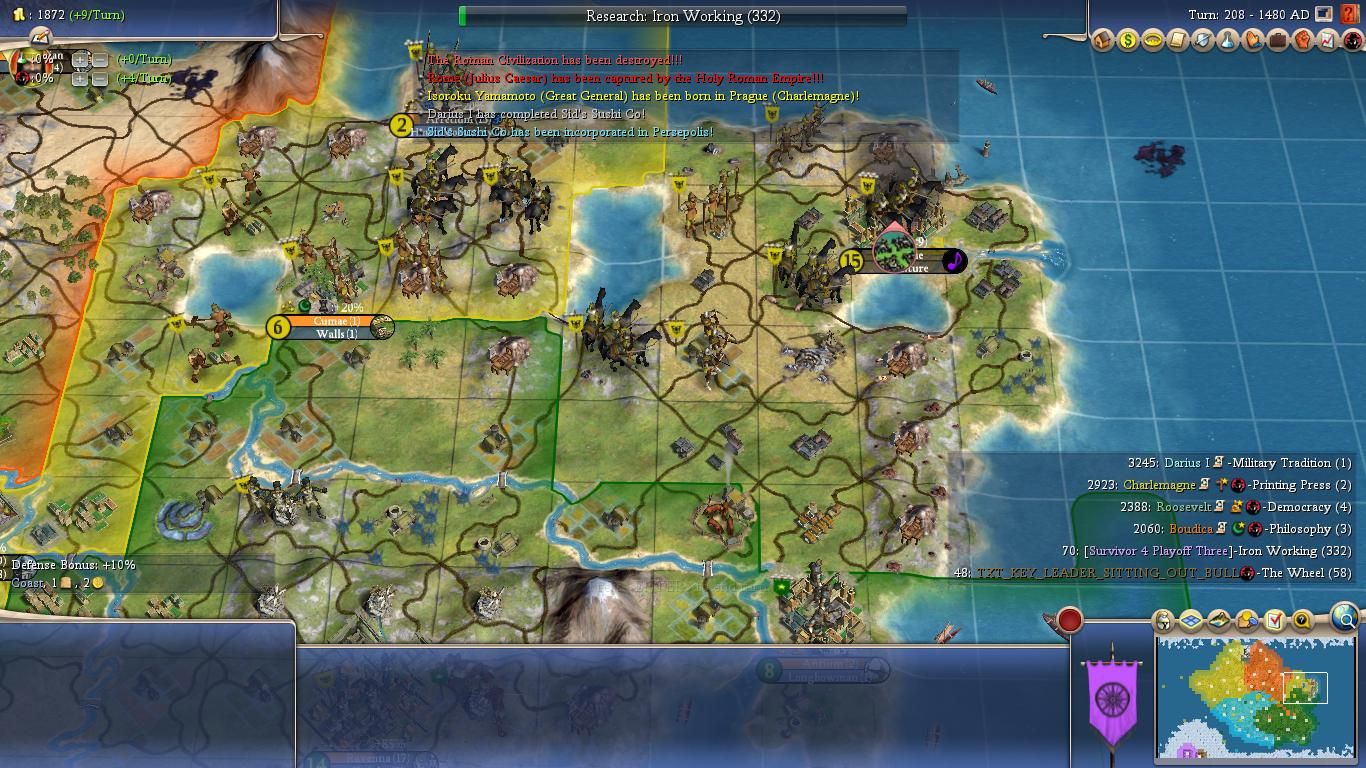
Far from the dominant force that he'd been in the opening round of Season Four, Caesar turned out to be a total nonentity here in the playoffs. As a leader, he's good at expanding and fighting wars but weak at the economic side of the game, and this was a game where he had never been able to get his research into proper shape. Caesar had crashed his economy early on and never recovered, unable to make good use of the jungle-heavy terrain outside of his capital. It was a good warning that "Rome with iron at capital" doesn't always necessarily come out on top.
The Holy Roman conquest of three Roman cities combined with Boudica's ongoing campaign of terror gave Charlemagne the edge in his backburner competition with Roosevelt. He had pulled well ahead on the scoreboard and seemed likely to make further territorial gains against the Celts if Charlemagne could ever get past the Apostolic Palace. Indeed, Charlemagne declared war on Boudica once against just seven turns after eliminating Rome, this time managing to capture two more border cities before Boudica once again shut down the war with the AP. However, time was beginning to run out for Boudica. She had fallen behind in technology and both Charlemagne and Roosevelt were about to unlock rifles and cavalry. Furthermore, she could not pull out a "stop the war" resolution against Roosevelt because he lacked Islam in any of his cities. (Oddly, she never tried to vote on a crusade resolution against the Americans.) Roosevelt might be pretty terrible at fighting wars, but even he could capture cities when it was rifles and cavs against longbows. By Turn 242, the Americans were on the offensive in earnest:

Tolosa was the first Celtic core city to fall, not one of the border cities which had often been traded back and forth, and it was a sign that the collapse of Celtica was underway. Charlemagne had also returned to the war for the fourth incarnation of the Holy Rome vs Celts deathmatch, and by this point the numerical advantage was hugely in favor of the boys in yellow. American and Holy Roman units swarmed across the northern plains burning and capturing everything in sight. Boudica tried one final time to stop the war in the Apostolic Palace but by now she lacked enough population to vote through a successful resolution. Roosevelt's military incompetence meant that he took only a single prize, the city of Tolosa highlighted earlier. Everything else was captured by Charlemagne, who also claimed the elimination credit on Turn 251:

It was hard to see this as anything other than a deserved outcome for Boudica, who had started the feud with Charlemagne earlier and only survived this long due to the Apostolic Palace. She likely should have been eliminated much earlier in the game, which could end up being highly significant since Darius was approaching the end of the tech tree. Holy Rome was now the territorial juggernaut on the continent, controlling about 45% of the world's land area and approaching the Domination limit. (Charlemagne was actually closer to the land requirement than the population requirement, interestingly enough.) However, Charlemagne was still well behind Darius on the tech tree, something like eight to ten techs by my rough estimate, and it seemed unlikely that he'd be able to catch up to the Persians who had been merrily researching away for the whole game. Furthermore, both Darius and Charlemagne will not plot war at "Pleased" relations and both of them were "Pleased" with one another, meaning that they would never attack. This game looked like it was heading for a peaceful conclusion, and that was very much to the advantage of Darius.
That is, unless Roosevelt decided to do something insane:

Roosevelt decided to invade Darius?! FDR had been so peaceful throughout the game, making essentially no attempt to conquer the weak Romans, and now he thought that it would be a good idea to attack the Persians? What kind of madness was this?!  Needless to say, attacking the highly advanced Persians was an exceptionally bad idea. Roosevelt's armies were still based in the rifles and cavs era while Darius was able to make use of infantry, machine guns, and tanks. The slaughter of the American forces was immediate and executed with extreme prejudice. One turn there were a bunch of green units in Persian territory... and the next turn there were suddenly none of them left standing. Once those units were mopped up, Darius wasted no time pushing eastwards with his tank armies and began overrunning one American city after another. He was joined in the war a few turns later by Charlemagne, who had only been able to attack at all because the American invasion had resulted in a "you declared war on our friend!" diplomatic penalty, dropping Holy Rome's relations down to "Cautious" status with Roosevelt. Up against both of the world's most dominant powers, Roosevelt collapsed in less than twenty turns. Charlemagne picked up a pair of cities but Darius did all of the heavy lifting here, scoring everything else for Persia along with the finishing blow:
Needless to say, attacking the highly advanced Persians was an exceptionally bad idea. Roosevelt's armies were still based in the rifles and cavs era while Darius was able to make use of infantry, machine guns, and tanks. The slaughter of the American forces was immediate and executed with extreme prejudice. One turn there were a bunch of green units in Persian territory... and the next turn there were suddenly none of them left standing. Once those units were mopped up, Darius wasted no time pushing eastwards with his tank armies and began overrunning one American city after another. He was joined in the war a few turns later by Charlemagne, who had only been able to attack at all because the American invasion had resulted in a "you declared war on our friend!" diplomatic penalty, dropping Holy Rome's relations down to "Cautious" status with Roosevelt. Up against both of the world's most dominant powers, Roosevelt collapsed in less than twenty turns. Charlemagne picked up a pair of cities but Darius did all of the heavy lifting here, scoring everything else for Persia along with the finishing blow:

Roosevelt may not have had a clear path to victory but he was very much in line for survival right up until he started the war with Darius. Instead, he was swiftly removed from the game and joined all of the other failed leaders from this game in the dustbin of history. Ironically, his attack on Darius was probably bad news for Charlemagne, who no longer had a clear path to a Domination victory. If Holy Rome had been able to invade America and capture all of that territory with Persia still sitting on the sidelines, it might have been possible to amass enough land and population to get over the top. That was no longer an option now, with Darius having enough of each to block any military-based victory. And with both Darius and Charlemagne sitting at "Pleased" with one another (having scored even more "mutual military struggles" bonuses from this latest war), it appeared that Darius had the victory on lockdown. He was still about eight techs ahead in the space race and only needed to research the last few remaining spaceship techs. We were right on pace for a Persian spaceship victory right around Turn 320 or so.
And then Darius decided to prove that he could be even more idiotic than Roosevelt:
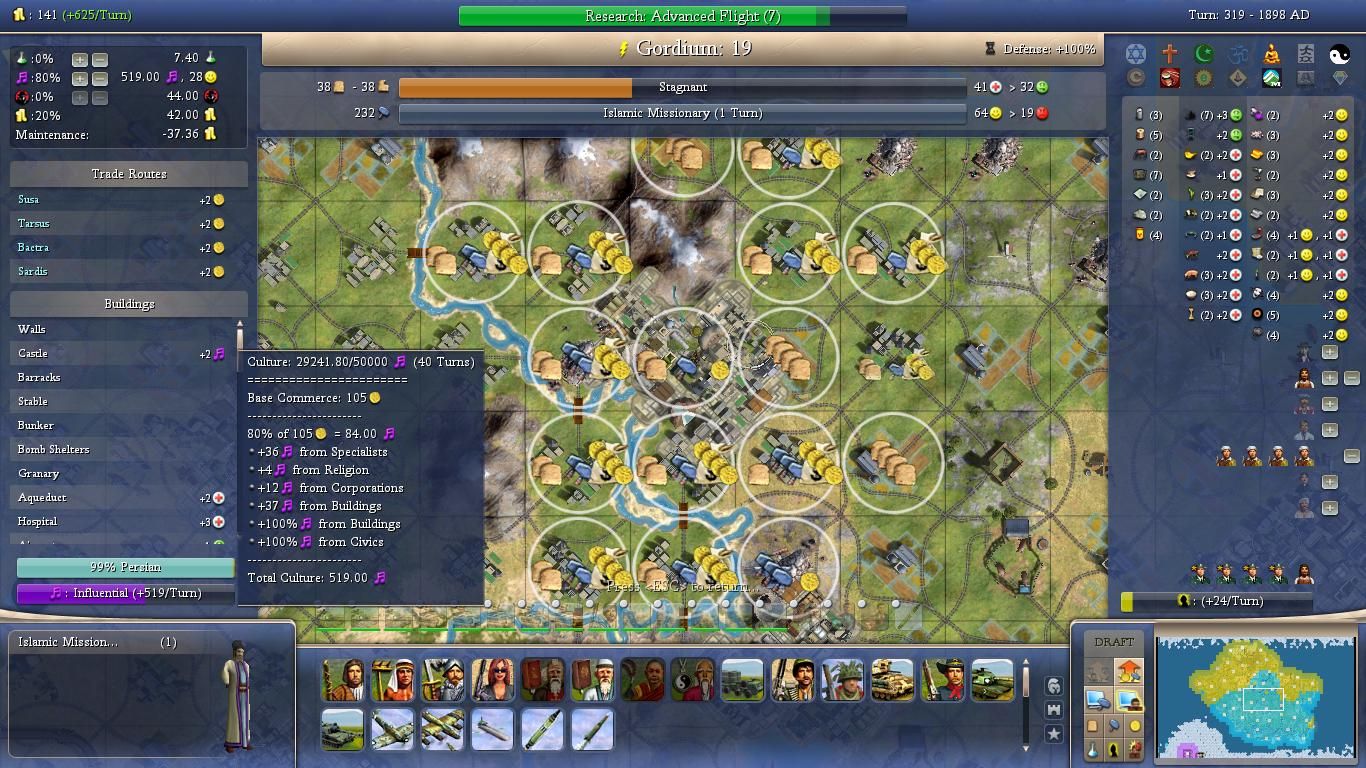
With exactly four spaceship techs remaining, Darius turned off his research and began chasing after a Cultural victory. 

 This was mindblowing stupidity that beggared belief, stopping pursuit of a spaceship victory that was 20 turns away to chase after a cultural victory that was 50+ turns away. Darius had two cities that were close to going Legendary, but his third city of Gordium wasn't about to hit the 50,000 culture mark until about Turn 360. Gordium had no cathedrals at all and none of the lategame cultural wonders like Broadway or Hollywood to boost its cultural output. Furthermore, Darius wasn't even using Build Culture in the city or running 100% on the culture slider; he was running 20% wealth in order to spread his corporations around his territory more fully. Pure madness - what in the world was he thinking?!
This was mindblowing stupidity that beggared belief, stopping pursuit of a spaceship victory that was 20 turns away to chase after a cultural victory that was 50+ turns away. Darius had two cities that were close to going Legendary, but his third city of Gordium wasn't about to hit the 50,000 culture mark until about Turn 360. Gordium had no cathedrals at all and none of the lategame cultural wonders like Broadway or Hollywood to boost its cultural output. Furthermore, Darius wasn't even using Build Culture in the city or running 100% on the culture slider; he was running 20% wealth in order to spread his corporations around his territory more fully. Pure madness - what in the world was he thinking?!
As a result, we sat back and clicked Next Turn for the following forty or so turns waiting for a resolution to the game. Charlemagne slowly advanced through the tech tree making up ground on Darius, knocking out one spaceship tech after another as the Persian leader foolishly sat around running the culture slider. This actually turned into a fairly close race between the two of them, with Charlemagne's spaceship narrowly edging out Darius' attempt at a cultural ending. The two leaders remained "Pleased" with one another despite a bunch of spying shenanigans, therefore ruling out any fighting between the two. Eventually Charlemagne launched his spaceship at the end of Turn 338, thus resulting in a finishing date ten turns later on Turn 348. Gordium ended up falling five turns short of this mark, with a Legendary ETA due on Turn 353. No last second Great Artist culture bombs appeared and Charlemagne was the winner when his spaceship arrived on schedule:

It was a profoundly stupid ending to an otherwise interesting game. Charlemagne certainly played well enough to make the Championship Game, and if his victory had come in another fashion he would have been a deserving winner of this playoff game. But to come out on top only because Darius literally threw away his victory left this outcome with a bit of a sour taste. There was a general sense that the AI leaders in this game hadn't been particularly strong as a group, and I think that the ending served to reinforce that notion. A whole bunch of the strongest leaders ended up in the first playoff game by chance, leaving the other two games with somewhat weaker fields. Between Roosevelt's absurd attack and Darius' incredible self-sabotage, it was hard to avoid the conclusion that Charlemagne had been left as the winner here by default.
In any case, we now had our final two leaders for the championship. Charlemagne and Darius would be joining Willem, Kublai Khan, Gilgamesh, and Stalin to determine the overall winner of Season Four. One of those six AIs would take home the crown and achieve eternal glory in this competition. Check back for the final result to find out who came out on top at the end of Season Four.



